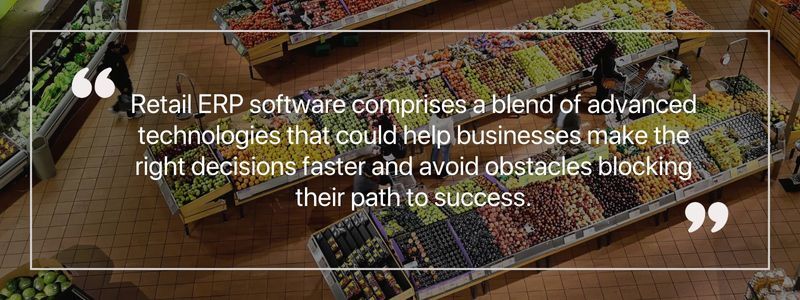7 Common Retail Mistakes that ERP Could Fix
Doing everything manually
Retail businesses have multiple moving parts and processes that operate simultaneously. When these processes are handled manually, it becomes prone to human error.
Implementing the right ERP solution could help. It automates processes and streamlines all the areas of your retail stores, including inventory planning, task allocation to multiple employees, tracking customer needs, controlling cash flow, managing purchase orders, keeping records of relevant documents and making them available when needed, integrating point-of-sale (POS) system, and more. This increases operational efficiency, reduces errors, and enables you to make the best use of the available resources and time.
Not reviewing your retail operations
Any negligence could ruin your business efficiency. So, reviews are crucial to ensure that you are not making any mistakes and stay on top of everything happening in your store. Timely reviewing and framing of good strategy also help you meet consumer demands, optimize operations, and have adequate control over them. In addition, they could identify issues and take corrective action faster. But when retailers keep records of these audits using spreadsheets or other inadequate methods, they often fail to maintain consistency.
An ERP system would keep track of your past audits and notify you about the scheduled upcoming ones. This way, you could ensure that your inventory management is done correctly, orders are processed on time, your store has all the high-selling stock displayed, and so on.
Not investing enough in employee expertise
Employees are always crucial to any business. Not just hiring the right people is essential; training them enough is also vital. This might cost you extra. But if you have a competent workforce, they would better manage the store and create an unforgettable experience for your customer.
ERP software with an HR management module could make hiring, training, and retaining key talents easier. Leverage the technology to find suitable candidates, onboard them, monitor performance, keep a record of details, deeply engage the workforce, and increase their productivity to improve profit margins.

Failing to streamline customer communication
What the customers expect is always crucial for retail businesses to succeed. If you do not know your customers well, it is highly likely that you would keep on selling the wrong products. This also leads to choosing the wrong target audience who are not interested in buying your products or services and investing your efforts in marketing strategies that would not have favorable outcomes.
To solve this challenge, retailers need to implement an ERP solution that facilitates instant connections between buyers and prospects, and keeps track of their communication and preferences to help businesses focus on potential customers.
Using an out-of-date payment system
Advanced POS billing software for retail lets your customers pay through their preferred payment methods, such as credit or debit cards, mobile wallets, and more. The integrated system streamlines payments, which prevents miscalculation, simplifies financial reports, improves inventory management, and keeps track of transaction details.
On the flip side, using an out-of-date payment system could complicate accounting, make it difficult to share information with other departments, slower your service, and have no or incomplete details on the receipt.
Not retailing on multiple channels
Selling on different channels helps increase your retail sales. For instance, a store located in some remote area might not get much footfall but still could generate revenue through online selling of their goods. Unfortunately, not many retailers utilize this opportunity to engage with and sell to their customers. Data collaboration is one of the biggest challenges that is retreating them from selling their products on multiple platforms.
ERP software for retail could solve this issue. The system centralizes the data collected from all sources and makes it instantly accessible. You get a single location to manage all your selling processes. It helps you create and organize items you sell, determine channel-specific pricing, manage inventory, sales orders, and other procedures.
Not using data strategically
Successful retail business always needs to track what is happening in the store, such as their top-selling products. They could use the information to understand the dynamics of inventory and make decisions about procurement, including ordering slow-moving goods in fewer quantities, not stocking problematic products, and getting more of the items with the highest turnover.
Keeping track of the data using spreadsheets is not error-free. It needs ERP software with intelligent tools that could record trends, customer preferences, pricing levels, and industry-specific operating metrics. All this information is favourable for making the right business decisions faster.
How to Choose the Best Retail Software?
Business success depends on a variety of factors. Investment of time and money certainly makes a positive impact but implementing the right software brings down the chance of common pitfalls.
Fill in the form to connect with us and find the right software solution that could help take your business to newer heights.







